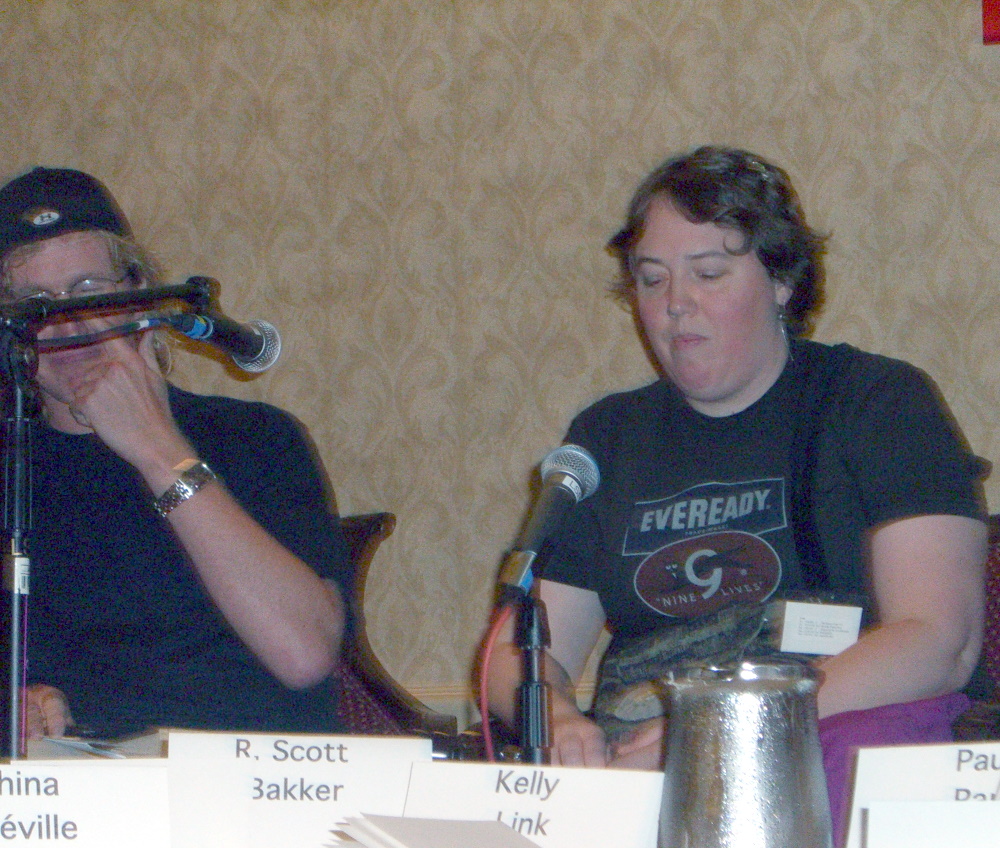A panel on the uncomfortable in science fiction and fantasy at Readercon 2006
According to my notes, this was a panel on “the uncomfortable” in science fiction and fantasy. I don’t have a more concrete title. But the general tack of the panel was about stories that make a reader uncomfortable versus those that bring comfort.
In retrospective, that was the most insightful and interesting panel of the ones I attended at this Readercon. Which makes me think that writers are really at their best when they talk about writing, as opposed to, let’s say, science.
I am sorry that my pictures are so atrociously bad. This was years before I realized that to take a good picture of a group of people talking animatedly, you have to take about ten times as many pictures as you think you’ll need. One picture out of fifty may be the one where nobody is caught with a strange facial expression mid-sentence.
But on to the panel.
China Mieville. I like not just science fiction or fantasy, but art in general that attempts to undermine notions of consolation and comfort. Art that does that is actually much more honest about the nature of reality. Reality is fractured, it is conflictual, there is no comfort in it every day.
Scott Bakker. Endings that console people are a good thing, but deceptive, or sentimental consolation is something I have difficulty with.
David Hartwell asks if there is a sense in which good fantasy has it both ways?
(I’m not sure if he meant both comforts the reader and disturbs them in the right way? — E.)


Ellen Kushner mentions horror, and how “horror implies that there is no purpose to anything, and no salvation, no hope, and bad things are going to happen. But the best fantasy always has an underlying scheme and purpose to it, there is an implication and a promise that someone knwos what’s going on.”
China Mieville disagrees, giving Tolkien as an example. The kind of austere consolation that Tolkien is best at, it is much less comforting than much of horror, because it [implies] that something is being lost to us. That’s what makes him much better than many of his contemporaries.
China Mieville goes even further to say that narrative itself is consoling, because even if everything goes horribly wrong, it happens for a purpose. Even if it only esthetic purpose. The only fiction he can think of that tries to break even that purpose is very aggressive modernistic fiction, dada, etc.
“I much more enjoy books that feel like something rubs against the grain, than enjoying the books that try to smooth everything out. So enjoyment and comfort is not the same,” says China Mieville. He mentions Michael Swanwick’s novel “The Iron Dragon’s Daughter” as an “absolutely shattering piece of fantasy that exists at the intersection of understanding of limits and potential of fantasy itself”. (I hope I heard the title of the book correctly. — E.)
Paul Park. Genre readings have two expectations that are mutually exclusive, and a skillful way of handling a book is to find a way to cater to both of them. Readers look for things that are deeply familiar, consoling because they conform to patterns they’ve seen. At the same time they look for things they’ve never seen before, things that are wildly different. Fantasy is successful because it satisfies both those expectations.

This segues into an interesting discussion about the good and bad aspects of comfort, and what do people even mean by that word.
Scott Bakker. Once you start to experiment with different forms, and you start conflating the forms, you end up evolving outside of the range of expectations of large masses, large groups of readers. In the North American society there are groups of people who want everything to be prepackaged, they have no tolerance for the breaking of form. They value commodity like ease of use. So you end up leaving a lot of people behind.
Whereas if you are true to form, you end up literally bridging that divide. You end up reaching people who would never read anything other than predigested comfort food. So the emphasis on form has been detrimental to [ability to reach the masses]

China Mieville. But what’s wrong with comfort? I have my own ideas what’s wrong with it, but [there’s nothing wrong in wanted to be comforted].
Scott Bakker. There’s nothing wrong with it. what’s wrong is when large swaths of population are completely given over to comfort. You want to have a mix. You don’t want it all to be comfortable. Nor uncomfortable either. We are allergic to uncertainty, we are allergic to complexity, we want things to be simple.
Kelly Link. I am comforted by the language, by voice, by certain kinds of story, but I am also comforted by things that don’t resolve. Resolution equals in many ways death. I am comforted by the idea that there’s something out there that someone is taking a good hard look at. That’s comforting.

China Mieville. The word “comfort” is very dangerous, because it segues into enjoyment, and I want to disaggregate them. So I prefer consolation. Consolation implies that something is going wrong. What I don’t like in fiction and art is when I feel it’s lying. In no way it’s talking about sweetness and light. Maybe military thrillers are most vicious, disgraced kinds of comforting fantasy. They say, it’s OK, man. [Makes a noise and gesture of pressing a gun’s trigger.] I’ll sort it for you. And they know it’s a blatant lie.
Kelly Link in the hallway of Readercon 2006

David Hartwell with his daughter on stage at Readercon 2006 on Saturday night. Right before the Bad Prose contest, David Hartwell received birthday greetings from the audience. (By the way, the Bad Prose contest was the funniest event I ever experienced in a science fiction convention, but it is impossible to describe — you had to be there.)

In the convention hotel bar in the evening, left to right: Scott Bakker, a person whose name I don’t know, and Liz Gorinsky.

In the convention hotel bar in the evening, left to right: Scott Bakker, a person whose name I don’t know, Liz Gorinsky, and John Scalzi
